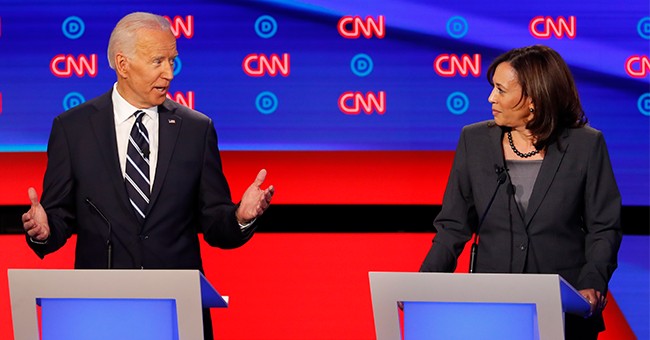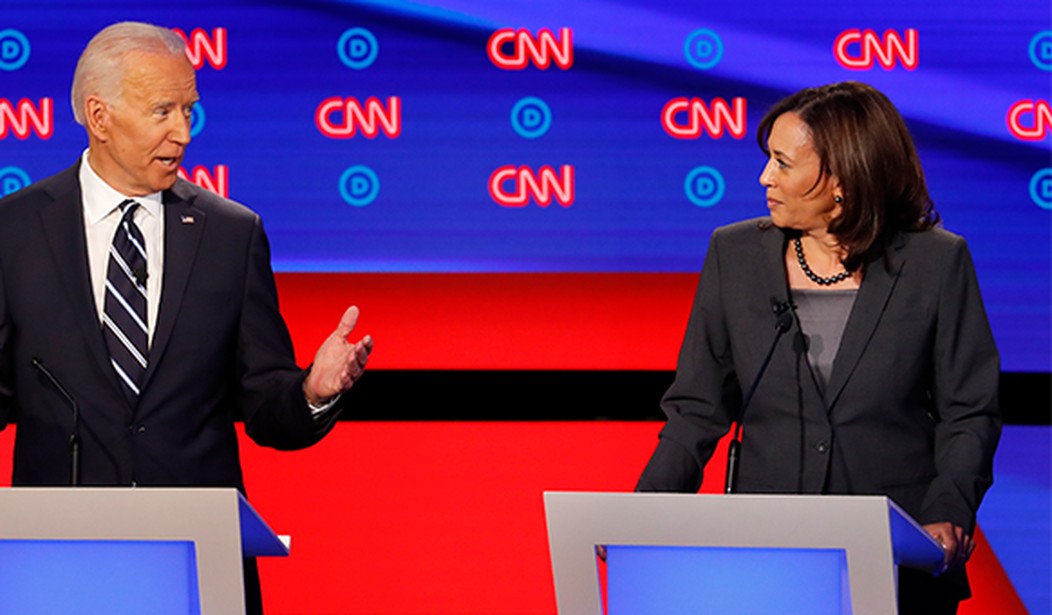
——
In the run-up to the inevitable announcement yesterday that Sen. Kamala Harris (D-CA) had been selected as Joe Biden’s vice-presidential running mate, questions were being raised by conservative commentators and the Trump campaign about whether Sen. Harris still believed Biden was a racist, considering how she blasted him during a June 2019 debate over his past stance on forced busing and working with segregationist senators.
Her apologists in the mainstream media, of course, were quick to defend her by pointing out that Harris never technically called him a racist – as if the word actually has to be used in order for the claim to be true.
Though Harris “technically” has an out on that issue, one she doesn’t is in comments she made during her failed presidential campaign about how she felt regarding the Democratic women who went public and accused Biden of appropriate touching and sniffing. Harris stated… she believed them:
“I believe them and I respect them being able to tell their story and having the courage to do it,” Harris said at a presidential campaign event in Nevada.
The California senator added that Biden will need to decide for himself whether to run for president.
“He’s going to have to make that decision for himself. I wouldn’t tell him what to do,” Harris said.
Watch the comments she made in early April 2019, just a few weeks before Biden formally declared his candidacy:
Sen. Kamala Harris (D-CA), who is now being considered as a VP pick for Joe Biden, said the following about Biden’s accusers last April: “I believe them and I respect them being able to tell their story and having the courage to do it”
Does she believe Tara Reade? pic.twitter.com/A1Asfx5kqB
— Kingsley Cortes (@KingsleyCortes) April 27, 2020
Harris also declared in September 2018 that she believed then-SCOTUS nominee Brett Kavanaugh’s accuser Christine Blasey Ford, saying “I believe her. […] Anybody who comes forward at this point to be prepared to testify in the United States Senate against someone who’s being nominated to one of the most powerful positions in the United States government, that takes an extraordinary amount of courage.”
But after Tara Reade’s rape allegation against Biden was made back in March – and when Harris was vying to be Biden’s VP nominee – she gave a a much different answer, rambling on about how it was important for Reade to be able to “tell her story” but that she was inclined to believe Joe Biden because he was an honorable man or something:
Harris told The Chronicle that Reade “has a right to tell her story. And I believe that and I believe Joe Biden believes that, too.”
Harris said the case raises “a bigger structural issue, frankly, which is that women must be able to speak without fear of retaliation.”
The senator said she could “only speak to the Joe Biden I know. He’s been a lifelong fighter, in terms of stopping violence against women.” She pointed to his lead role in passing the Violence Against Women Act in the Senate in 1994.
“The Joe Biden I know is somebody who really has fought for women and empowerment of women and for women’s equality and rights,” Harris said.
So much for believing all women and having an “extraordinary amount of courage” to accuse a powerful man of rape, right?
To be fair, the standard should not be that if you support one woman’s allegations you should support them all. The issue is in how believability standards should not be based on the political party affiliation of the person being accused, nor should it be based on a person’s political ambitions at the time.
But as Harris has shown over and over again throughout her career, she is willing to say whatever it takes to get ahead in politics, even it if means smothering the concept of due process under the guise of “believing all women” on one hand, and then conveniently backtracking on those “standards” later when they are inconvenient to her agenda.
If Harris is miraculously asked by a member of the fawning press corps at some point down the line if she still stands behind Biden’s accusers, it will be interesting to see how – and if – she responds. If she says she does, then the fact she’s chosen to be his VP running mate will make her look like a traitor to women who chose her ambition over (supposed) principle. If she says she doesn’t, she’ll look even more like the shameless political opportunist she is.
Either way, it wouldn’t be a good look, but that would be nothing new for Harris.














Join the conversation as a VIP Member